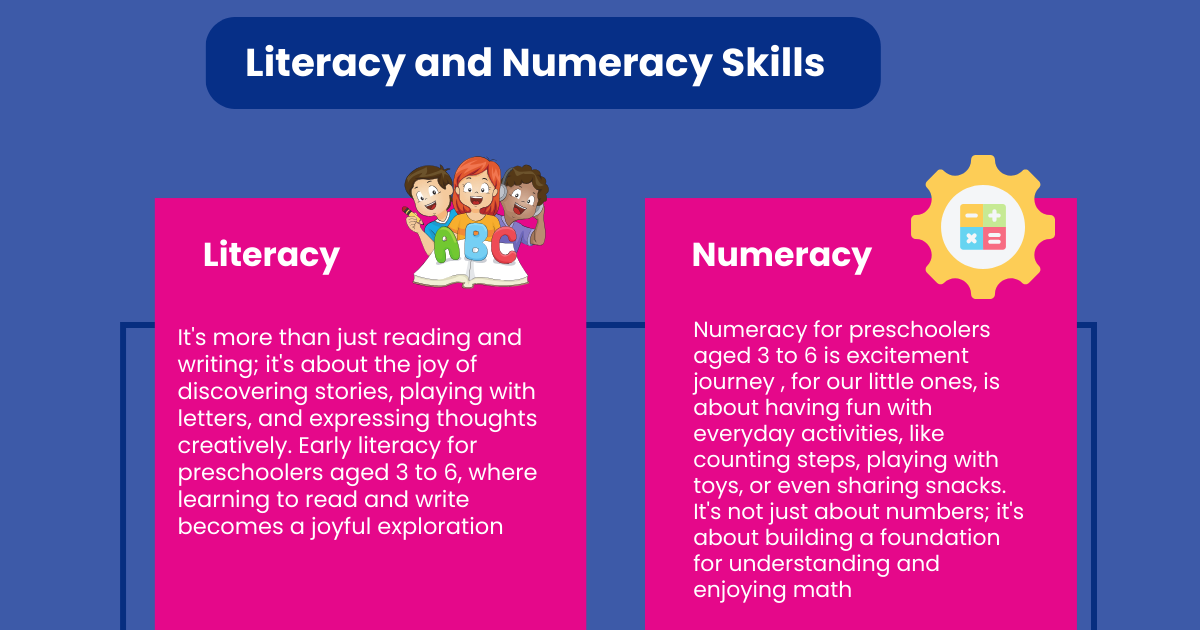Definitions of Literacy and Numeracy Skills

Literacy and numeracy are the cornerstones of navigating our world. Literacy empowers us to understand and use language effectively, allowing us to read, write, speak, and listen with comprehension and purpose. Numeracy equips us with the ability to work with numbers, solve problems, and make informed decisions. Together, these skills form the foundation for learning, communication, and critical thinking, essential for success in both personal and professional spheres.
For children aged 3 to 6, literacy is like a magical adventure that involves exploring the world through words and pictures. It’s more than just reading and writing; it’s about the joy of discovering stories, playing with letters, and expressing thoughts creatively.
Picture colourful books filled with exciting characters, adventures, and friendly sounds that make learning letters and words a delightful experience. Literacy for preschoolers is a playful journey of listening to stories, singing catchy rhymes, and using crayons to make squiggles that eventually turn into letters. It’s about learning to talk, listen, and share ideas with friends.
As these little ones embark on their literacy adventure, they are not just learning the ABCs but also building the foundation for a lifetime of communication, creativity, and connection with the world around them.
Building Early Literacy – (Engage, Explore, and Create with Your Child)
- Language Powerhouse – Talk, sing, and read with your child daily. Make up silly stories, narrate your daily activities, and point out letters and words everywhere—grocery lists, street signs, even cereal boxes!
- Story Time Magic – Curl up with colourful picture books, act out scenes, and encourage them to “read” along (even if it sounds at first). Choose diverse characters and stories that reflect your child’s interests.
- Rhyme Time – Nursery rhymes, poems, and songs are fantastic brain-boosters. Clap, wiggle, and jump to the rhythm. Make up your silly rhymes together!
- Alphabet Adventure – Sing the alphabet song, point out letters in their names and favourite objects, and let them explore letter magnets or play dough. Focus on a few letters at a time and make it fun!
- Scribble & Draw – Encourage their artistic side with crayons, markers, and paper. Please talk about the shapes and colours they create, and even turn their scribbles into stories together.
Literacy is not just about academics , It is about empowering individuals to participate actively in their communities, learn new things, and express themselves confidently.
Numeracy
For our little ones aged 3 to 6, numeracy is like a magical journey of exploring and playing with numbers. It’s not just about memorizing facts but about having fun while learning to count, sort, compare, measure, and make sense of the world around them.
From counting toys to sorting shapes, numeracy involves engaging in activities that build a strong foundation for understanding mathematical concepts. It’s about fostering curiosity and developing critical thinking skills by making math a part of everyday play.
These early numeracy skills go beyond just preparing for school; they help preschoolers in everyday adventures, from sharing toys to understanding basic concepts of time and quantity.
So, as we play and explore together, we’re laying the groundwork for a lifetime of enjoying and confidently navigating the world of numbers.
Early Numeracy Nurtured – Counting Adventures and Playful Learning
- Counting Adventures – Encourage counting in daily routines, like steps, toys, or snack items.
- Playful Games – Introduce counting games with dice or board games to make learning numbers fun.
- Musical Learning – Sing number songs to add a harmonious and enjoyable element to numeracy.
- Hands-on Exploration – Engage in simple cooking activities, letting them measure ingredients and grasp basic math concepts.
- Patience and Positive Reinforcement – Cultivate a patient and positive learning environment to foster confidence.
Conclusion
Preschoolers benefit significantly from early exposure to both literacy and numeracy. While literacy lays the foundation for language skills, creativity, and communication, numeracy introduces them to the world of numbers, fostering essential skills for problem-solving, logical reasoning, and everyday tasks.
Both literacy and numeracy contribute to a well-rounded educational journey, providing the tools necessary for a lifetime of learning and exploration. Encouraging these skills positively and engagingly during the early years sets the stage for future academic success and a love for continuous discovery.
Both literacy and numeracy are complex and dynamic, constantly evolving alongside our world. The key is to create a love for learning and provide opportunities for children to explore these skills in fun and meaningful ways.